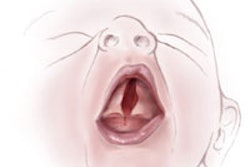Researchers from the University of Louisville have identified the gene that may be responsible for the development of facial clefts, according to a study in Experimental Biology and Medicine.
In the U.S., a baby is born with a facial cleft every hour, the study authors noted in a press release. Such birth defects are the result of gene mutations and environmental factors.
Prdm16 is a transcription factor originally described as being aberrantly activated in specific types of leukemias and more recently as a master regulator of brown adipose tissue differentiation. This latest research shows that this transcription co-factor plays a critical role in the development of the embryonic palate (EBM, April 20, 2012).
Dennis Warner, PhD, and his co-investigators at the University of Louisville Birth Defects Center conducted a chromatin immunoprecipitation-promoter microarray analysis to identify genes regulated by Prdm16 in cells isolated from the secondary palate of mouse embryos.
This approach revealed the developmental processes regulated by this protein that are important for palate development.
More than 100 genes whose promoters were bound by Prdm were identified in the study. These genes were found to be linked to such diverse processes as chromatin remodeling and muscle and bone development.
The study found that loss of Prdm16 expression led to a significant decrease in the expression of osteopontin, a marker for bone formation, and an increase in the expression of Myf-4, a marker for muscle development.
Mice lacking the gene for Prdm16 exhibit numerous defects, including a complete cleft of the secondary palate and a shortened mandible, the researchers concluded.



















